US Offers $15m For Capture Of Iranian Businessman
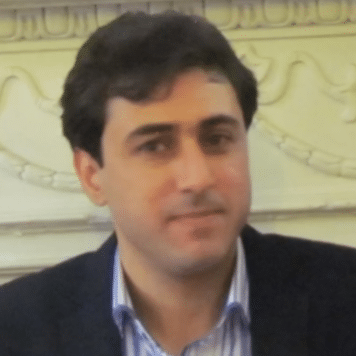
The United States has announced a bounty of up to $15 million for any information leading to the apprehension of Iranian businessman Hossein Hatefi Ardakani.

The United States has announced a bounty of up to $15 million for any information leading to the apprehension of Iranian businessman Hossein Hatefi Ardakani.
Ardakani is accused of aiding in the acquisition of technology for attack drones sold to Russia. He faces sanctions and charges for his alleged involvement in procuring dual-use technology utilized in drone production by Iran's Islamic Revolutionary Guard Corps (IRGC).
The decision to issue the bounty comes amidst growing concerns over Iran's provision of drones utilized in various conflicts, including Russia's war on Ukraine. The Commerce Department, responsible for administering US export controls, disclosed the bounty as part of a broader effort to combat national security threats.
“US-origin flight guidance components procured by the Ardakani network have been identified in recovered wreckage of Shahed drones in Ukraine and other conflict zones. Additionally, the Ardakani network has illegally procured US export-controlled high electron mobility transistors (a.k.a. HEMTs) and other components with ballistic missile applications, as well as other electronics with weapons application,” said Rewards for Justice, the fusion intelligence center created by the State Department that oversees domestic and foreign intelligence committees.
Despite an outstanding warrant for his arrest, Ardakani remains at large, with Tehran listed among his possible locations. People with information on Ardakani's whereabouts are encouraged to come forward through channels including Signal and WhatsApp.
The huge bounty underscores the gravity of sensitive technology proliferation amidst ongoing conflicts. US agencies are stepping up collaboration to enforce export controls, signaling heightened penalties for violators. The move aligns with the Biden administration's call for increased vigilance among businesses to prevent Iran's acquisition of materials supporting its ballistic missile program.
Ardakani joins a long list of wanted figures with bounties on their heads such as Irish gang leaders in Dubai and Somali militants. In January, a $10m reward was offered for information regarding financiers of Iran-backed Palestinian militia, Hamas.
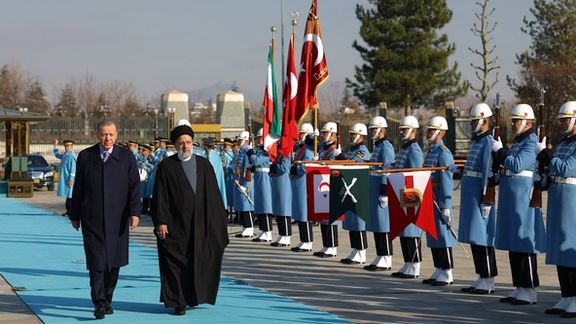
Iranian President Ebrahim Raisi’s visit to Turkey this week came against the backdrop of the Gaza war, ongoing regional crisis and conflicts in bilateral relations.
The visit on Wednesday and the issues discussed reflected the intricate dynamics between Iran and Turkey. The visit resulted in ten agreements, emphasizing collaboration in energy, free trade, and transportation. This highlights the significance of political collaboration and dispute resolution in the Iran-Turkey relationship, striking a delicate balance between cooperation and addressing regional complexities amidst geopolitical challenges.
Raisi's visit highlighted ongoing efforts to strengthen economic relations, while forging an image of agreement on regional issues. While mutual distrust may persist, the visit and their evolving relationship indicate a continued effort to navigate complex ties, focusing on economic cooperation and potential areas of convergence in regional policies.
Challenges
Geopolitical competition, conflicting regional goals, and security concerns drive friction between Iran and Turkey. Despite joint efforts to combat terrorism, drug trafficking, and enhance regional security, political and ideological disagreements persist, heightened by the evolving political landscape in the Middle East. Historically, both nations have sought to exploit the shifting regional balance, intensifying rivalry, particularly in Syria and Iraq. Collaborative efforts against the PKK and PJAK and shared economic and security interests are overshadowed by significant differences.
While the Islamic Republic emphasizes the economic aspects of the relationship to improve morale at home, the significance of Raisi's visit to Ankara lies in discussions on regional security, stability, and shared concerns regarding terrorist groups and Kurdish factions. Raisi and Erdogan likely addressed Ankara's concerns about Kurdish groups viewed as "terrorists" in Turkey, Iran,Iraq, and Syria during their meeting. The bilateral talks also touched upon the impasse in Gaza, where Israel continues its operations against Hamas, a client of Iran and a friend of Turkey.

Gaza War
The Israel factor introduces complexity to the Turkey-Iran relationship, marked by historical ties encompassing trade, tourism, and some intelligence and military collaboration. Geopolitical shifts, particularly Turkey's stance on Syria to the detriment of Iran’s ally Bashar al-Assad, strain the ties.
The recent Gaza conflict has influenced the dynamics between Iran and Turkey, resulting in a mix of collaboration and tensions. The relationship's intricacies involve a blend of collaboration and rivalry, influenced by geopolitical, economic, and security factors. Khamenei's call to "cut vital lifelines" to Israel contrasts with Turkey's ongoing economic ties, highlighting nuanced dynamics. Turkey's pursuit of economic relations with Israel may diverge from Iran's objectives, as Tehran leverages the Gaza war to enhance its regional influence through proxy groups amid tensions.
Economic Cooperation
A wide range of circumstances have shaped Iran and Turkey's economic relations. Both countries have continued their business relations, particularly in the oil industry, despite Iran's economic difficulties and sanctions. The two sides have tried to find solution, such as "gas for commodities" and Iran’s natural gas exports. President Ebrahim Raisi's declared goal of increasing bilateral commerce to $30 billion annually is indicative of ambitious economic aspirations.
However, trade between Iran and Turkey reached a modest $4.4 billion in the first 10 months of 2023, a 16 percent decline from the same period the year before. Mehdi Safari, the Deputy for Economic Diplomacy at the Ministry of Foreign Affairs, mentioned that President's visit to Turkey would focus on strengthening energy cooperation, including the extension of the gas contract. Collaborative efforts in investing in Iran's gas resources and establishing an electricity connection from Khoy to Van were indeed discussed, but to what extent Raisi’s wish list would materialize is somewhat questionable. The present natural gas agreement between Iran and Turkey is scheduled to expire in 2026. This emphasizes the difficulties and unknowns involved in maintaining the two countries' economic partnership.
The anticipation is that Iran-Turkey relations will encompass both collaboration and rivalry, characterized by mutual mistrust alongside a maintained level of cooperation. Although a significant shift in their relationship might not be on the horizon, cooperation is expected to persist in counterterrorism, fighting drug trafficking, and promoting regional stability. Both nations have a track record of finding common ground amid occasional conflicts, navigating the complexities of their intricate relationship. The delicate balance between cooperation and rivalry is influenced by geopolitical realities and their respective objectives in Iran-Turkey relations.
President Raisi's visit to Turkey may not immediately resolve ongoing issues between the two countries. Beyond official statements, a comprehensive approach is necessary to examine conflicts and cooperation, particularly in areas like theSyrian crisis, and Kurdish issues. It's noteworthy that Iran's potential inability to supply more natural gas to Turkey due to anatural gas shortage adds another layer of complexity to the situation.

Amid denials of embezzlement allegations, Iran's Parliament Speaker claimed corruption goes against his Islamic principles.
"Can anyone claim to embrace the culture of jihad and martyrdom while being a thief and embezzler?" Mohammad-Bagher Ghalibaf questioned, defending himself against ongoing accusations.
The controversy surrounding Ghalibaf deepened with the resurfacing of a leaked audio tape from February 2022. The tape revealed discussions between top Revolutionary Guard generals regarding a major corruption scandal, implicating Ghalibaf during his tenure as Tehran's mayor.
The discussion captured in the recording implicated Ghalibaf, former Qods Force Commander Qasem Soleimani, IRGC Coordination Deputy Jamaloddin Aberoumand, and Chief of the IRGC Intelligence Organization Hossein Taeb in attempts to conceal the embezzlement of 80,000 billion rials (approximately $3 billion at the time) between Tehran municipality and a firm controlled by the IRGC.
The funds, primarily allocated for Qods Force activities, mysteriously vanished during transactions between the municipality and Yas Holding, a subsidiary of the IRGC's Cooperatives Foundation engaged in various sectors, including services, dealership, and housing subcontracting.
Yas Holding faced official dissolution in 2018, merely two years after its inception, following the arrest of several officials. Among the four individuals charged, including Ghalibaf's deputy in the Tehran municipality, Isa Sharifi, all were convicted, handed lengthy prison sentences, and ordered to return a portion of the substantial sums they embezzled.
Despite previous accusations of financial misconduct, Ghalibaf has managed to evade investigation, leading to speculation about his close ties to Supreme Leader Ali Khamenei.
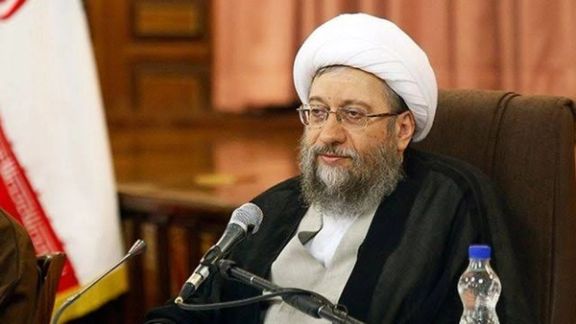
In a candid admission, the head of Iran's Expediency Council addressed the pressing economic issues faced by a significant portion of the population during a speech on Wednesday.
Sadegh Amoli Larijani attributed the challenges to rampant inflation and a surge in prices, underscoring the strain on citizens, partly attributing it to inadequacies in official measures. Global sanctions have had a huge impact on the economy, first imposed due to Iran's nuclear program and more recently, for its crackdown on protesters and support for Russia in its war on Ukraine.
Downplaying the economic disaster which has seen millions thrust into poverty, Larijiani said, "There are issues in the country, but it should be noted that if there is authority and security in the Islamic Republic system, the economic situation will also improve".
However, concerns about security persist in Iran, as officials grapple to provide adequate protection. Earlier this month, a commemoration ceremony for the former IRGC commander Qassem Soleimani in Kerman resulted in the death of at least 95 people after a double bombing by ISIS, highlighting the ongoing challenges faced by Iranian authorities in maintaining public safety.
A recent report indicates that the impact of inflation is more severe than officially acknowledged. The Fararu website in Tehran revealed that the point-to-point inflation rate in December exceeded 40%, surpassing the average figure announced by authorities. The index suggests that Iranian households spent approximately 40% more in the past month compared to the same period in the previous year to fulfill their needs and purchase essential goods and services.
According to the Iran Statistical Center's definition, the point-to-point inflation rate represents the percentage change in the average of the price indices compared to the previous year, providing a more tangible perspective on understanding price hikes. The reported point-to-point rate for the past month stood at 44.4%, surpassing the government's predicted annual rate of 25% for the current Iranian year, which began on March 21.
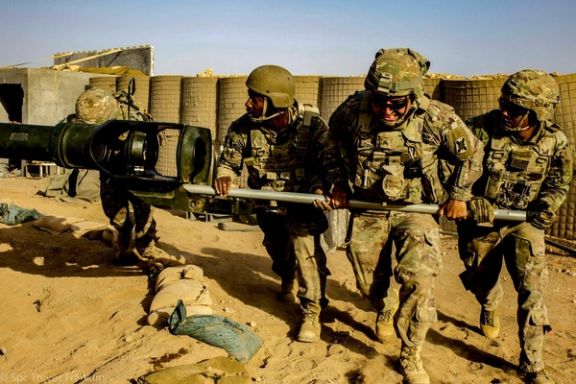
The Pentagon has denied media reports that the Biden administration may be considering a full withdrawal of American troops from Syria in 2024.
A report in Foreign Policy Wednesday suggested that “the White House is no longer invested in sustaining a mission that it perceives as unnecessary,” quoting “four sources within the Defense and State departments”.
But a Pentagon spokesperson has called the report “erroneous,” according to the Russian RIA Novosty, which had submitted a query to the US Department of Defense.
A withdrawal would be a gift to Iran and its affiliated groups in Iraq and Syria, who have been launching attacks on US forces with the exact same goal. A similar likelihood exists in Iraq, where pro-Iranian groups dominating the parliament have been demanding the withdrawal of US and coalition forces.
The issue is far from clear however.
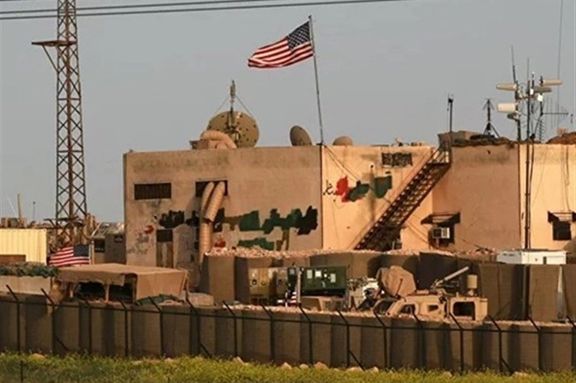
Charles Lister, director of the Syria and Counterterrorism and Extremism programs at the Middle East Institute, who has penned the FP report admits that “no definitive decision has been made” within policy circles of the Biden administration.
Senior, well-placed reporters and observers like Alex Ward of Politico and Aaron Y. Zellin of the Washington Institute have posted conflicting opinions on the matter, both quoting unnamed US officials denying the report.
“I'm actually encouraged to see the White House and Department of Defense come out so quickly to deny,” Lister wrote on X, commenting on rejections of his FP report, “it shows the kind of sensitivity that normally exists only when the claim is true.”
Earlier in the week, reports emerged of a US national security meeting to discuss a plan to urge the Kurdish forces in Syria to partner with the Assad regime against ISIS. Such a plan, if true, would be in line (or complement) any withdrawal plan –to address the vacuum created by the likely absence of American troops.
The Pentagon was quick to deny the report, however, according to CNN, claiming that there was “no intention” to support a partnership between Assad and the Kurds.
But Amberin Zaman –who had broken the report for AlMonitor– hit back with more details to back up her original story.
“An interagency policy committee meeting to explore the idea was held on Jan. 18,” she posted on X. “Are they denying that the sub IPC where the subject was raised as per my admin sources took place?”
Policy circles do look at various scenarios and it would be far from surprising for them to study an eventual withdrawal of US forces from Syria. To ‘consider’ it in a US election year, and in the middle of an ongoing crisis in the region, however, would be a different story altogether.
Since October last year, armed groups backed by Iran have launched more than 150 attacks against American forces in Syria and Iraq. The attacks are said to be in support of Palestinians in Gaza who have been enduring an Israeli onslaught for more than 100 days –following Hamas rampage of border areas inside Israel on 7 October.
That may very well be true –in the short term. The long game, however, has always been to “kick the Americans out of the region,” as stated in clearest terms by many Iranian officials.
It’s hard to draw conclusions from what has been reported so far. But it’s not that hard to imagine the Biden administration contemplating a withdrawal, taking into account its track record in the Middle East, in general, and its Iran policy, in particular. Critics have pointed out the lack of a coherent policy and an eagerness to appease Iran and avoid escalation regardless of Tehran's actions.
A complete pullout of American troops from Syria may be farther away than suggested in the Foreign Policy report. Any such report, however, even if rejected by US officials as has been this one, would be music to the Ayatollah’s ears.
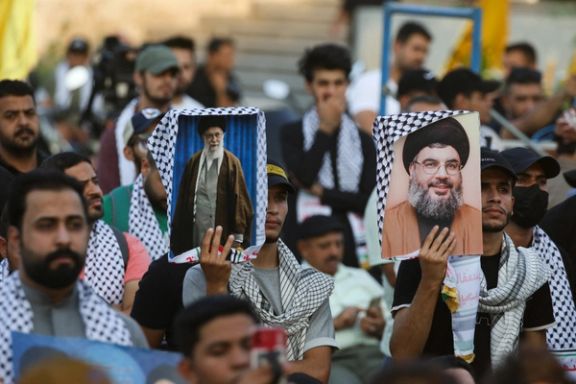
The Iraqi prime minister's office warned that US strikes on Iran-backed proxies on Tuesday would lead to an "irresponsible escalation".
In a statement issued on Wednesday, the Iraqi government expressed its disapproval, deeming the operations as "aggressive actions" that undermine years of cooperation between the two nations.
"These precision strikes are in direct response to a series of escalatory attacks against US and Coalition personnel in Iraq and Syria by Iranian-sponsored militias," US Defense Secretary Lloyd Austin said in a statement.
It came as a rare response to attacks by Iran-backed Kataib Hezbollah which has been carrying out strikes on US facilities in Iraq since the war in Gaza broke out, in response to US support of Israel's retaliation following the Iran-backed Hamas invasion on October 7.
Since the war broke out, over 150 attacks on US troops in Iraq and Syria have been carried out by Iran-aligned militants.
In spite of the retaliation, Kataib Hezbollah's military spokesperson, Jaafar al-Husseini, vowed to persist in targeting "enemy bases" until the end of Israel's bombardment in Gaza, a response to Hamas attacks which killed at least 1,200 mostly civilians in a single day and saw 250 or more taken hostage to Gaza.
On Wednesday, an armed drone reportedly targeted a base housing US forces near Erbil airport in northern Iraq, according to Reuters sources. Details of the incident have yet to be released.
While Iran has refrained from direct military involvement in the Gaza war to avert a confrontation with Israel and the US, its proxy forces in the Middle East have actively targeted US and Israeli interests, along with international shipping in the Red Sea.
Presently, the US maintains 900 troops in Syria and 2,500 in Iraq, working to advise and assist local forces in preventing the resurgence of the Islamic State, which seized substantial territories in both countries in 2014 before being defeated.